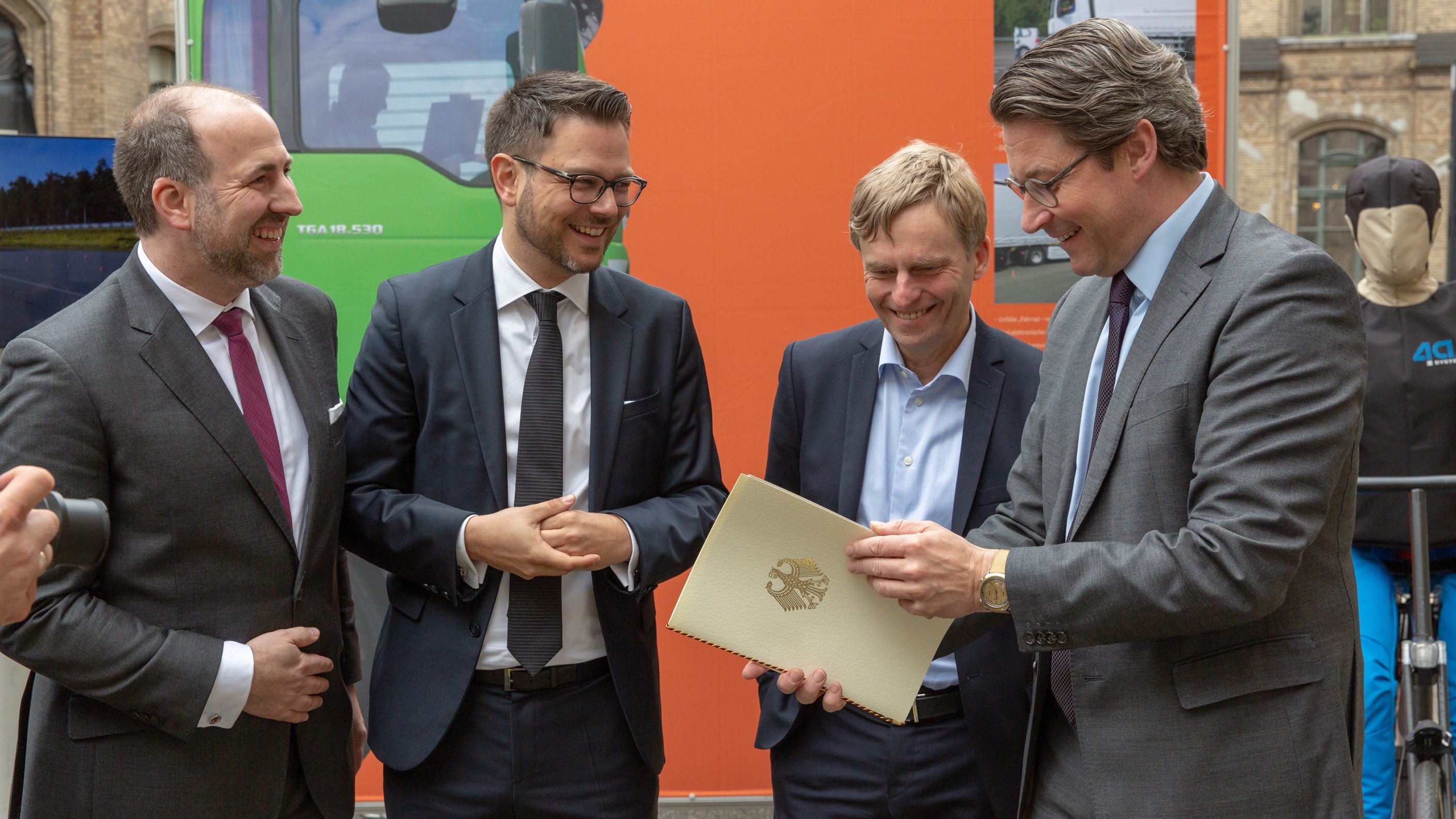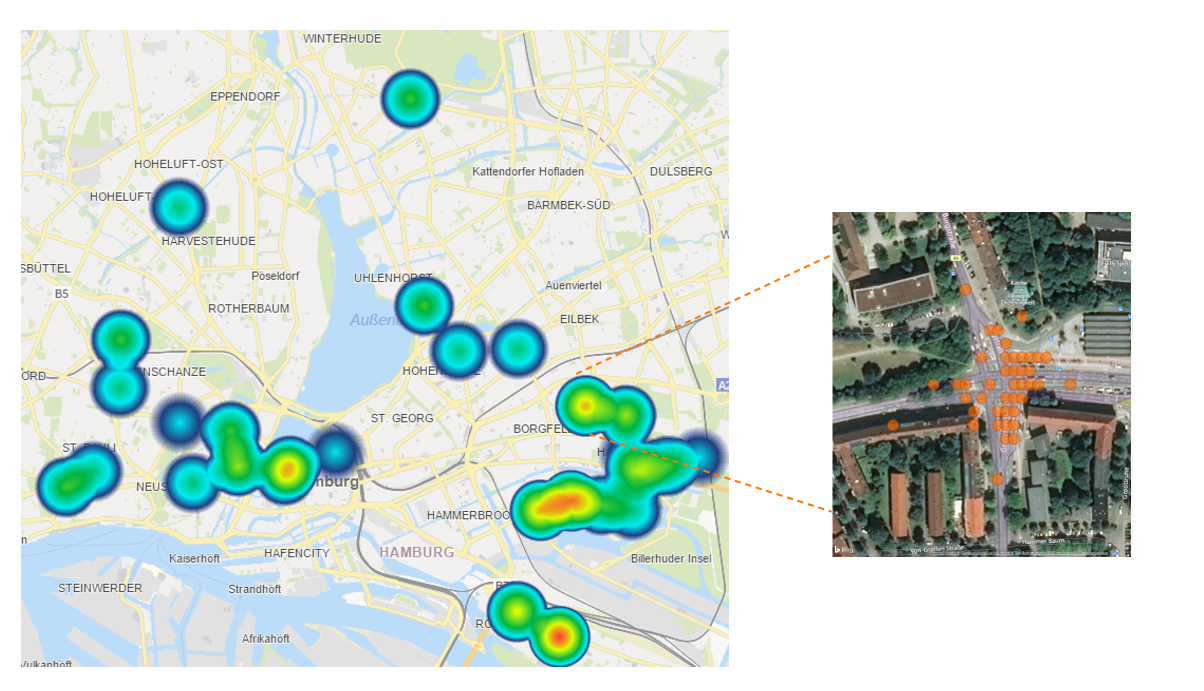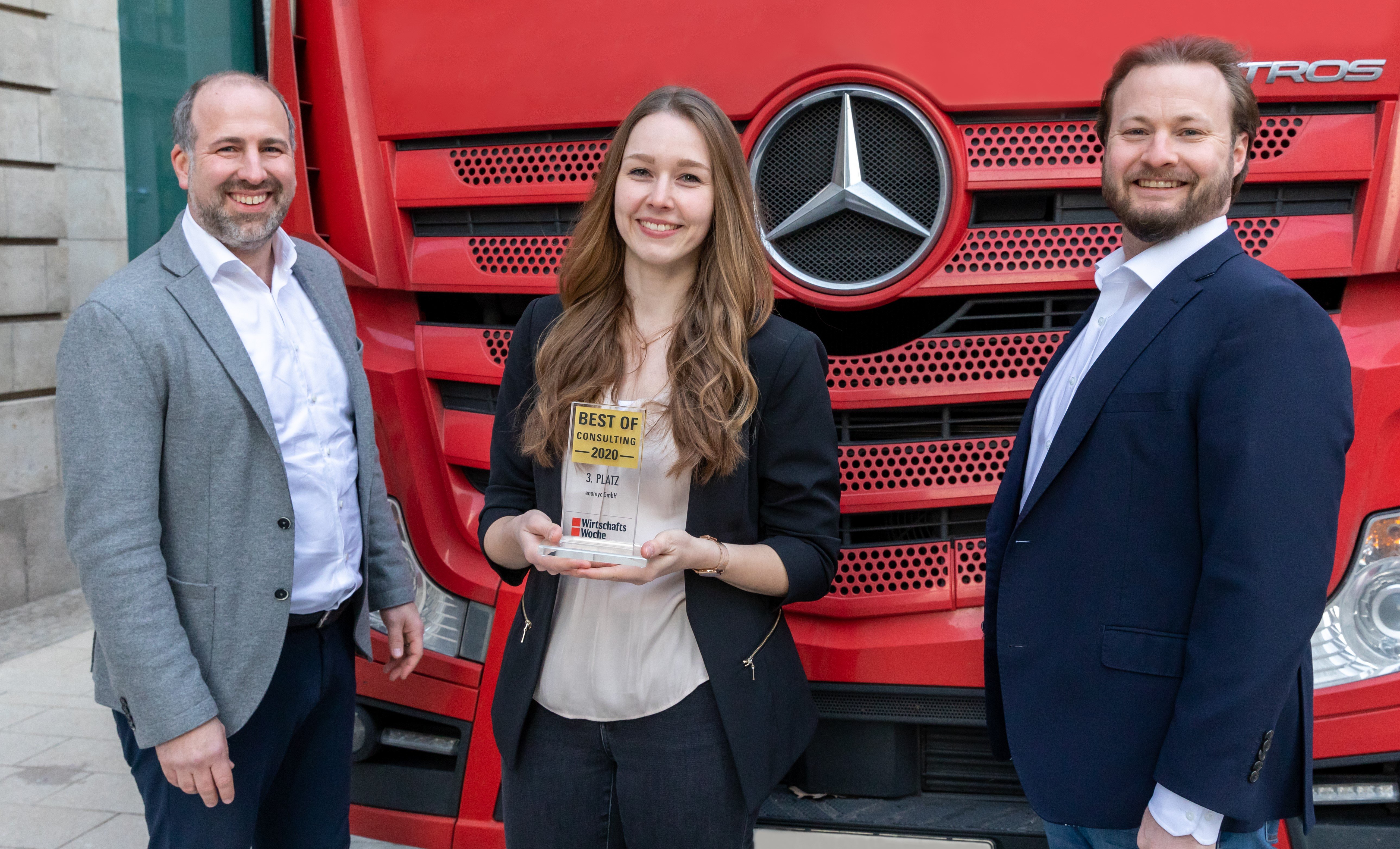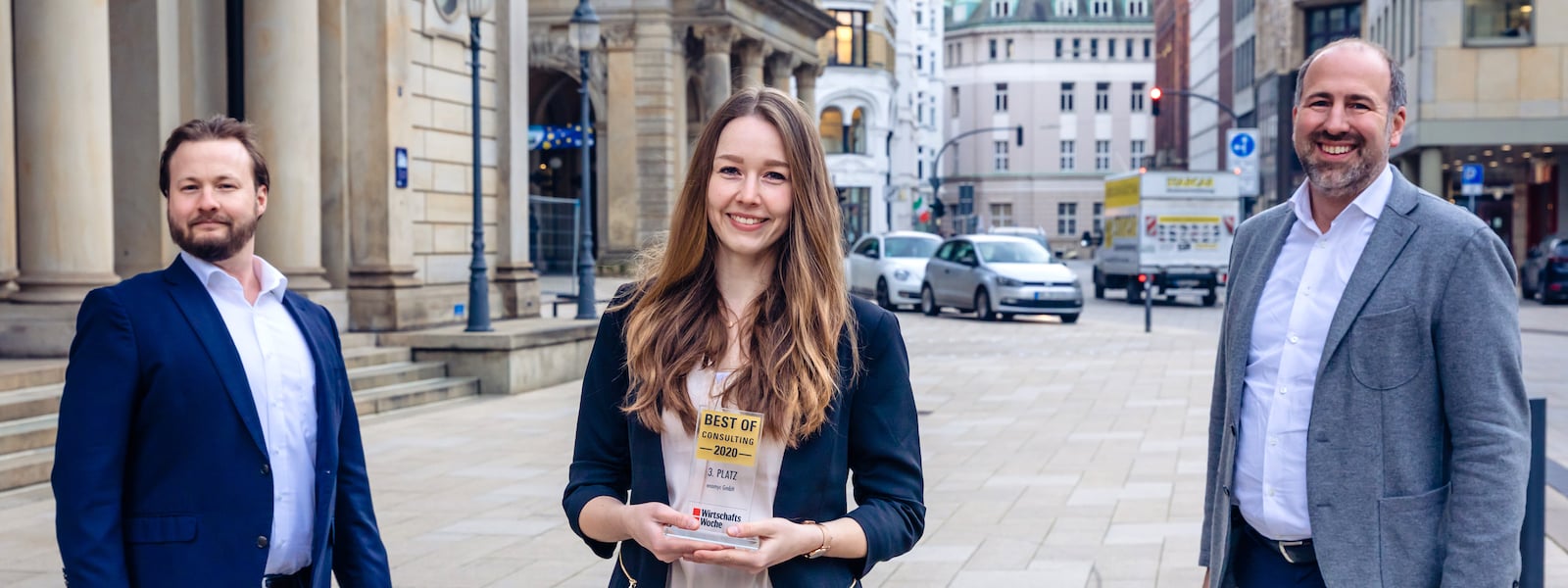Congratulations to Aileen Sommer, Head of Business Development Telematics at LUIS Technology, Dr. Matthias Feistel, Managing Director of LUIS Technology and Franz Wenzel, Managing Consultant at enomyc, for receiving the "Best of Consulting" award from a competition put on by WirtschaftsWoche! Their joint project saves lives: LUIS Technology and enomyc have digitally enhanced the camera software-based turn assistant LUIS TURN DETECT® in such a way that accidents resulting from the ominous blind-spot turns can be avoided not only at the moment of danger itself: The intelligent system can now even function as an early warning system.
We interviewed Dr. Feistel and Mr. Wenzel about the joint project: Why did LUIS opt for external expert advice? What has the digital further development of the system brought and what does the city of the future look like? Find out more below!
Congratulations! You have jointly received the WirtschaftsWoche "Best of Consulting" award. What do you think, Mr. Wenzel: What is the recipe for good cooperation and for the success you have achieved together?
Franz Wenzel: Mutual trust, openness, allowing each other their own headroom and the willingness to take entrepreneurial risks.
Mr. Feistel, for what reasons did you seek out external support for LUIS Technology?
Matthias Feistel: You recognize your own limitations somewhere, be it in terms of capacity or business know-how. In my opinion, outside perspectives and support should not only be sought for large-scale projects, but also on a very selective basis and for very specific issues.
LUIS Technology also plays it safe with its products. What tipped the scales in favor of developing the camera software-based turn assist system LUIS TURN DETECT®?
MF: We are specialized in camera monitor and driver assistance systems since 1999. The camera monitor systems are still a great help for drivers today. But only passively. For us an active warning system was needed! One that would take preventive action and significantly reduce turning accidents, in which cyclists are sometimes fatally injured. We were in the middle of the developments when public interest began to stir: There were calls and campaigns - think of the white Ghost Bikes that were placed at real accident sites. In addition, there were impulses from our families. At the same time, we started cooperating with the Federal Ministry of Economics. We were often at initial meetings and took the call for a quick workable solution very seriously. With our LUIS TURN DETECT® system, a top solution was launched.
 f.l.t.r. Andreas Scheuer, Federal Minister of Transport and Digital Infrastructure, with Rüdiger Kruse MdB, Chairman of the Hamburg CDU/CSU regional group, and Martin Groschke and Dr. Matthias Feistel, both Managing Partners of LUIS Technology, at the handover of the first ABE (General Operating Permit) in Germany, in the courtyard of the Ministry of Transport, on March 21, 2019. (Source: LUIS Technology) Translated with www.DeepL.com/Translator (free version)
f.l.t.r. Andreas Scheuer, Federal Minister of Transport and Digital Infrastructure, with Rüdiger Kruse MdB, Chairman of the Hamburg CDU/CSU regional group, and Martin Groschke and Dr. Matthias Feistel, both Managing Partners of LUIS Technology, at the handover of the first ABE (General Operating Permit) in Germany, in the courtyard of the Ministry of Transport, on March 21, 2019. (Source: LUIS Technology) Translated with www.DeepL.com/Translator (free version)
What exactly does the system do?
MF: It enables drivers to maneuver their trucks more safely on rural roads, but especially in the city, and to perceive vulnerable road users who are in the blind spot in good time. Turning accidents are sometimes a matter of milliseconds, when not all mirrors mounted on the truck can be seen at the same time. Here, our system provides comprehensive and timely warning via camera technology: The truck drivers view the blind spot via a screen. The image from the camera is evaluated in a small computer. If the algorithm classifies the situation as potentially dangerous, the system issues a visual warning. If drivers fail to react to this and still turn the steering wheel, a strong acoustic signal is also emitted. This enables them to act before a dangerous collision occurs.
 The right-turn situation in detail - The second row is the source of most fatalities and injuries here. (Source: LUIS Technology, Insurers Accident Research (UDV) & Federal Highway Research Institute (BASt)
The right-turn situation in detail - The second row is the source of most fatalities and injuries here. (Source: LUIS Technology, Insurers Accident Research (UDV) & Federal Highway Research Institute (BASt)
Mr. Wenzel, you started the joint project in June 2019. In what capacity and with what goal?
FW: Yes, I joined on an interim basis when the basic system was under development. It was to be made ready for the market. My tasks consisted of completing the project development, launching the product and finding a suitable project successor. The goal was to collect and evaluate the data reported by the system so that a dicey situation at a particular intersection would no longer be treated as a one-time event, but would be telematically exploited in such a way that LUIS TURN DETECT® could function as an early warning system.
Two more technology components were installed in the vehicles for this purpose: another controller and a GPS tracker. The corresponding back-end infrastructure was created - coupled with the software database. As a result, LUIS Technology can now provide local authorities, for example, with information about the danger of certain areas, so that they can then change traffic lights, infrastructure, speed and other preventive measures to mitigate accident blackspots.
This is where my successor Aileen Sommer came in and expanded the evaluation of the LUIS Prevent database. The collected data is now automatically clustered and maps the potentially most dangerous accident hotspots in the city of Hamburg. The next step will be to implement other major cities such as Munich, Lübeck and Cologne into the system. To this end, LUIS Technology is currently looking for suitable partners such as logistics companies or municipal transport operators.
 Hazard hotspots: LUIS Prevent database data is graphed to quickly and easily identify potential danger points. Source: LUIS Technology
Hazard hotspots: LUIS Prevent database data is graphed to quickly and easily identify potential danger points. Source: LUIS Technology
What impressed you personally about this project?
FW: LUIS Technology and its environment are in the midst of significant growth. There are continuous changes and the growing pains that go with them. At LUIS Technology, despite these circumstances, I was impressed by the interaction between the teams: how close and supportive the collaboration with the technicians and developers was. Every idea, every train of thought was taken up and examined. The motto was "Sky is the Limit" and "Just give it a try".
But it wasn't just the hands-on approach that impressed me at LUIS: The project with LUIS far exceeded what is considered typical consulting work, such as theoretical evaluations and working out concepts. I was involved in ongoing projects, flying to England and Ireland several times, for example, to identify any errors in customers' systems on site and to find adequate solutions for clients. And I was rarely welcomed so openly into an organization: I received immediate support for any request from any department and was even involved in team-building activities.
What was one of your first tasks?
FW: I will never forget that for Matthias: One of my first tasks was to lock myself in for a weekend with LUIS' demo products and completely take them apart. I was supposed to fully grasp them. As I am very fond of tinkering in my private life and am interested in drone technology, it was great fun for me to get involved with the telematics of LUIS' products to this extent.
Mr. Feistel, the city of Hamburg was your pilot customer. What other collaborations do you have?
MF: There are already hundreds of cooperations with logistics companies and many large municipalities, such as the city of Hamburg. The city's sanitation department is now fully equipped with our system. So are other parts of the Remondis fleet. We are currently equipping the city of Munich. We have a cooperation with the BGL association, with whom we opened the "#LogistikHilft" store in the spring - this now primarily involves the transport of relief goods such as protective equipment and Covid 19 rapid tests. The cooperation with SVG is new. We are also a member of Verkehrswacht Hamburg. It is also equipped with LUIS safety technology and trains and educates companies and students.
In general, we attach great importance to good partnerships, cooperation and collaboration with competitors, politics and associations - for example, for artificial intelligence with the associations ARIC and AI.HAMBURG. You never need to think that you know everything better yourself.
Do you feel safer on Hamburg's roads knowing about solutions like LUIS TURN DETECT®?
MF: Yes. Especially because I know that developments always continue.
In which direction are they going?
MF: The algorithm is being further improved so that detection is even more targeted - up to more than 40 meters behind the vehicle. The EU regulation, which comes into force in 2022, states that all new vehicle types in the truck sector must be equipped with a turn-off assistant that complies with this regulation. From 2024, the obligation will then affect all newly registered commercial vehicles in classes N2, N3, M2 and M3. In order to comply with this new regulation, further development of the technology is required. We are in the middle of this and will launch the system on the market at the beginning of next year.
What role does artificial intelligence play here?
MF: A significant one. It requires a learning phase in which the neural network recognizes and learns situations - for example, with cyclists, pedestrians, strollers - very precisely. And that's exactly why we founded the LUVIS AI joint venture and are developing the necessary software.
What does the city of the future look like to you?
MF: The theme that encompasses the entire project is "smart city" and the keyword "data utilization. We see a whole range of connecting points where a large amount of further, anonymous data can be generated and used in a meaningful way to make cities even safer and to achieve better flowing traffic. What is being developed now is just the start. Our telematics team is currently working with customers to develop forward-looking solutions, for example, for measuring the free loading space capacity of a trailer or truck box body, for intelligent temperature monitoring, for high-resolution video recording, or for preventive maintenance of mobile machinery.
What does the "smart city" look like to you, Mr. Wenzel?
FW: My dream would be a city without traffic lights, where self-driving, fully sensory e-vehicles are sharing the road, taking in every aspect of their environment into account in every way.
In conclusion, what thought would you like to share?
FW: I would like to thank Matthias and the two other managing directors, Martin Groschke and Dr. Moritz Kübel, and the entire LUIS Technology team for their cooperation. It’s great to to have the privilege of being able to experience such rapid and at the same time permanent growth with such a team and company. I could not have imagined a better successor than Aileen Sommer for this division. Everything has worked out very well so far!

Dr. Matthias Feistel, Aileen Sommer and Franz Wenzel (f.l.t.r.)


